2022
72nd Berlin International Film Festival
February 10 – February 20, 2022
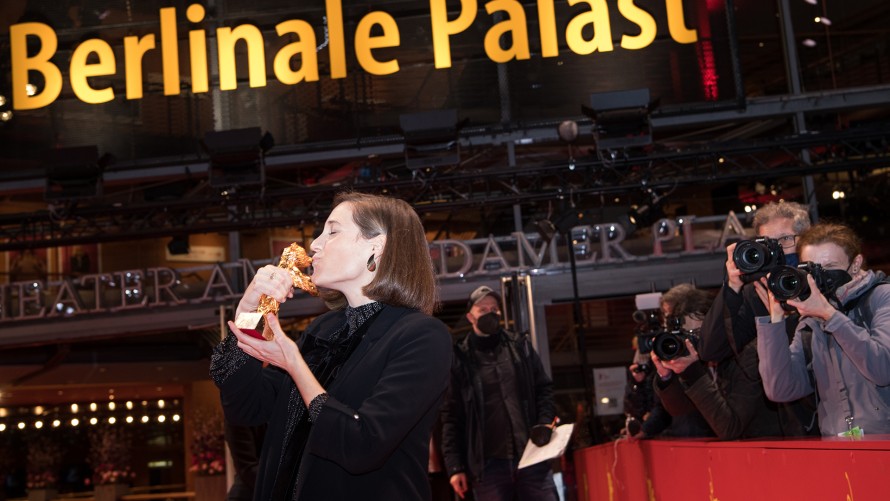
Best of Berlinale 2022
“This is not the Berlinale we anticipated having when we were planning it last summer, but compared to the situation we had one month ago, I think it’s a great achievement [...]. I think it’s an important signal to the film industry that it is possible to have a festival even in pandemic times [it’s] important for the city of Berlin as a signal to keep cultural life alive [and] it can be an important signal for the festivals to come after us.”
Carlo Chatrian (in “The Hollywood Reporter”, February 17, 2022)
After 2021, which – against all the odds – saw a successful festival, the 2022 Berlinale was another edition shaped by the pandemic, albeit under different circumstances. The virus had changed. Following a quiet summer, the soon-to-be-dominant Omicron variant of Covid-19 started to spread from November 2021. This variant was many times more infectious than its predecessors but led to fewer cases of severe illness. The hospitalisation rate and available capacity in the intensive care units of German hospitals thus became the new reference points for the local health policy and also the criteria upon which the fate of activities in the cultural sector rested. This meant that, in contrast to the previous year, Berlin cinemas were permitted to stay open throughout the autumn and winter, albeit under strict conditions.
When it came to questions about which form the 72nd Berlinale would be able to take, the situation remained deeply uncertain, however, because nobody dared to make any concrete predictions about the coming weeks, never mind the months ahead. Europe resembled a hotchpotch; cinemas were closed and then reopened. In France, the case numbers exploded, reaching into the hundreds of thousands, and it was only a matter of time before this “omicron wall” – nobody spoke of a “wave” any more – would arrive in Germany. The nightmare scenario of having to plan a festival with international guests in such an unpredictable situation took hold once again. As Katja Nicodemus summarised in an interview with “NDR Kultur”: “I don’t know whether culture [...] should be put above the risk of an increased incidence of infections. But I also don’t want to be in the shoes of the Berlinale management and take responsibility for answering this question” (January 19, 2022).
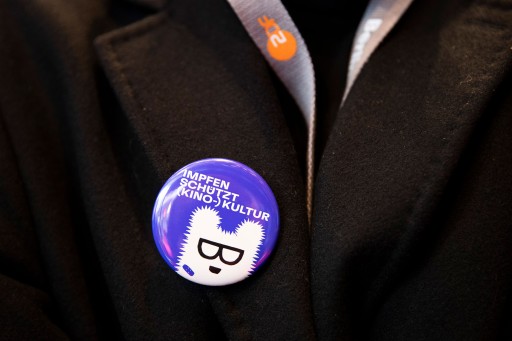
At the Berlinale, too, the motto was: Vaccination protects!
There were no guarantees, especially since the political landscape – which would have a decisive say over the further course of Covid-19 policies – had changed in September. The Merkel years in Germany had come to an end, the social-democratic party SPD with Olaf Scholz as the new chancellor now headed a coalition with the green party and the liberal party. In addition to the resulting reorganisation of the Chancellery and its state ministers, the cards were also reshuffled at the federal state level. In early December, the position of Federal Government Commissioner for Culture and the Media, whose ministry provides the lion’s share of the Berlinale’s budget, was filled by Claudia Roth. Franziska Giffey became the new Governing Mayor of Berlin and thus responsible for the restructuring of the Covid-19 regulations.
Quo vadis, Berlinale?
The festival directors were faced with a complex situation that involved many new players, and had to consider and balance different, sometimes conflicting interests and requirements. On the one hand, at the end of December nobody could guarantee that a festival due to take place in February would not have to be cancelled at short notice. On the other, an in-person Berlinale would send an important and strong signal to the cinema sector which had suffered massively from the restrictions for almost two years. Nobody wanted to risk a super-spreader event but, conversely, there were clear signs from filmmakers, producers and distributors that they really wanted to present their films in front of an audience and also that the audience itself was longing for a true festival experience.
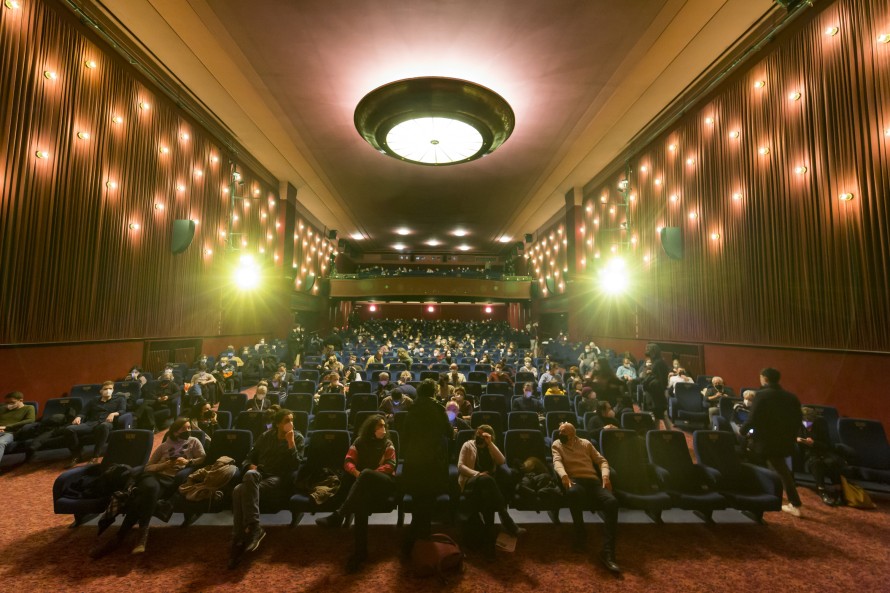
The audience has returned to the theatre, pictured here is the Delphi Filmpalast
Discussions about a festival in digital – or hybrid – form were reignited. Over the course of the year, some festivals had made a digital format part of their strategy to complement screenings in cinemas. The debate was less about an either/or situation and more about searching for a balance between the different forms of viewing – and, in the long term, about the perspectives of the changing institutions of the cinema and festivals. As Sebastian Seidler argued: “A hybrid festival offers the opportunity [...] to present the films to a broad audience. Ultimately, it’s about the essentials. Streaming does not mean doom, [...] it allows people even outside the big cities to discover films that may make them fall in love with the cinema once again” (“taz”, February 4, 2022).
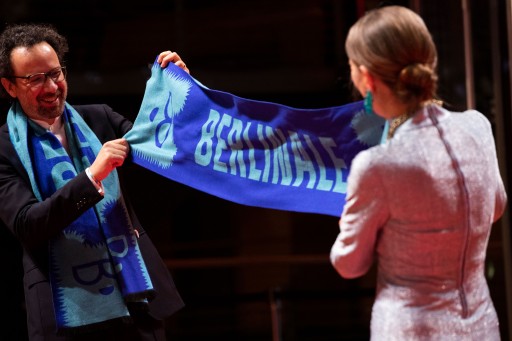
Something tangible: the Berlinale should take place in a physical form decided Carlo Chatrian and Mariette Rissenbeek
For the director duo, however, such considerations were never a viable alternative. As Mariette Rissenbeek emphasised in an interview in late January: “There will be no online version. The films we have selected cannot simply go online [...]. These films need a physical presence in order to be promoted and to be presented to the audience. That’s why they are actually looking for a festival” (in an interview with Peter Zander, “Berliner Morgenpost”, January 27, 2022).
The 2022 Festival Format
And so, on January 12, the final decision about the 2022 format was eventually announced: the Berlinale would take place as an in-person event, albeit with a 50 percent reduction in capacity at the venues and in adherence to strict hygiene regulations. The number of days featuring premieres with international guests was reduced to seven and the programme capped at “only” 256 feature-length and short films. The official Award Ceremony was scheduled for Wednesday; from the second Thursday onwards, the “Publikumstag” (“audience day”) – traditionally held on the festival’s final Sunday to present repeat screenings without the attendance of film casts and crews – would be extended to four days. Parties and receptions were suspended by the festival to avoid crowds and minimise contacts. As in the previous year, the European Film Market with the Berlinale Co-Production Market, as well as Berlinale Talents and the World Cinema Fund Day, would take place in digital form only.
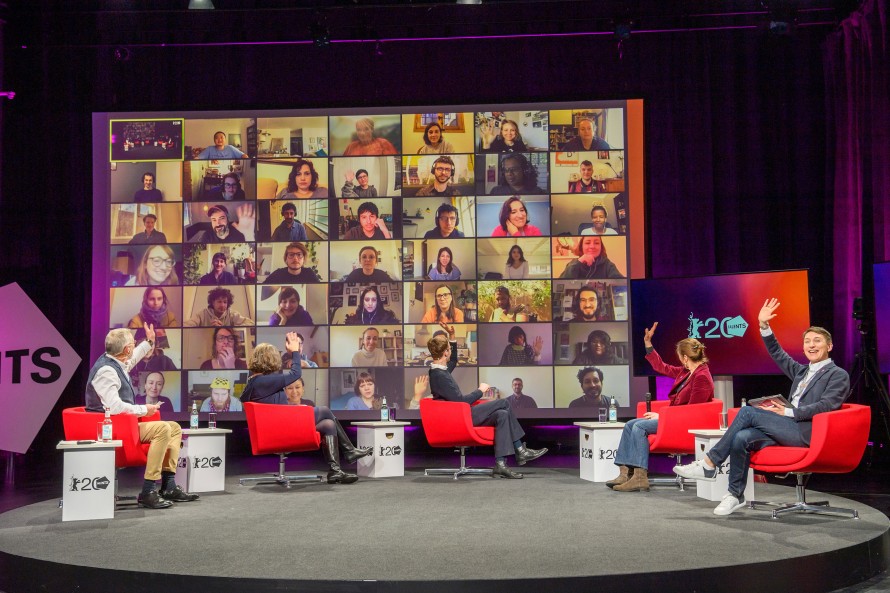
The industry events, like Berlinale Talents in its 20th year, adopted a digital format
The plan to hold an in-person festival prompted heated debates in the media. On January 19, 2022, “Zeit Online” carried the headline “Like Being in the Wrong Film” and rated the decision “reckless” and “outdated” (Wenke Husmann). Many commentators overlooked the fact that the Berlinale does not live from the films, series and installations alone: a fundamental aspect is going to the cinema – together – and experiencing the festival in a specific place, and the response to the films. As Hanns-Georg Rodek remarked in his later summary: “It is [...] not possible simply to decouple films and the city from each other, as would be the case if we were only bringing films into the living room. A hybrid Berlinale would have been the beginning of suicide by a thousand cuts. They were clever enough not to respond to the demands for a hybrid festival – because films are supposed to be seen in cinemas and because most of the producers would have withdrawn their films if the Berlinale had not been held as an in-person festival” (“Die Welt”, February 16, 2022).
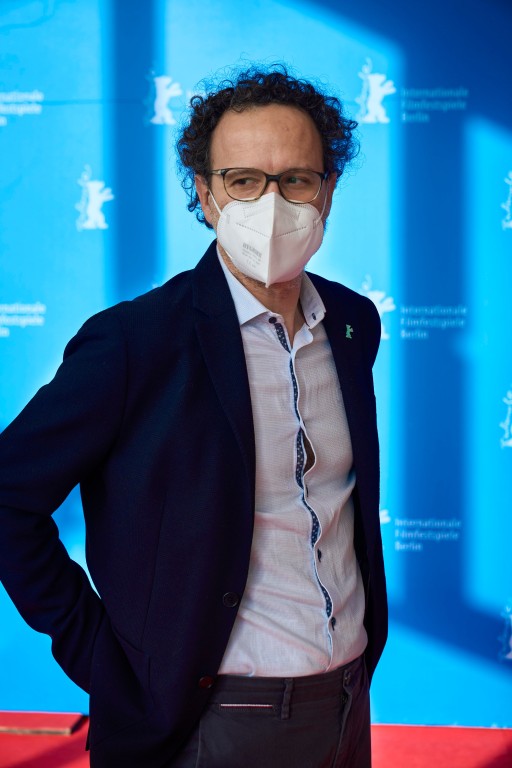
Carlo Chatrian, Artistic Director of the Berlin International Film Festival
Carlo Chatrian followed up in a very open and honest text entitled “Exercises in Resistance” in which he very clearly defined the function and mission of the Berlinale: “Films at a festival are shared in a space that belongs to nobody. You access it by agreeing to rules that cannot be waived. To take part in a festival means sharing an experience with other people who often have different tastes, backgrounds and cultural leanings. Seeing a film with other people at a social venue is an exercise in openness and humility – one we believe to be essential nowadays.” The Berlinale thus clearly positioned itself as the protagonist and preserver of a cinema culture that is defined not only by a certain aesthetic but also by a specific kind of architecture and sense of community.
The casts and crews were delighted by the opportunity to attend the premieres of their films in Berlin and were ultimately welcomed in large numbers during the festival. The incidence rates were continuously assessed up to the opening of the 72nd Berlinale. The festival management directors confirmed time and again that the decision for an in-person festival would remain unchanged. Hygiene policies were drawn up and adapted in close collaboration with the health authorities – and in the end were more restrictive than for cinema screenings outside of the festival.
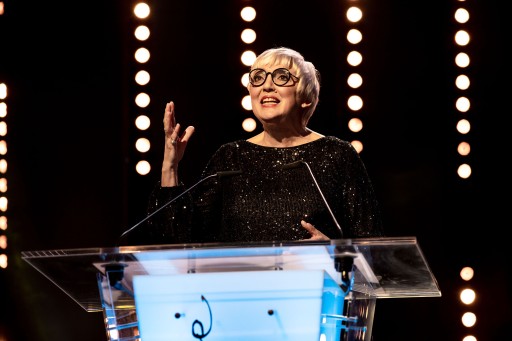
Claudia Roth, Minister of State for Culture and the Media
Ticketing for accredited persons was processed online for the first time, partly as a way to avoid crowds – an urgently required precaution given the infection rates. On the day of the Berlinale programme press conference on January 19, the number of reported cases in Germany surpassed the 100,000 mark for the first time, with the peak of the spread of the Oomicron variant predicted for mid-February, exactly coinciding with the dates of the festival. The Berlinale found a great ally in the new Minister of State for Culture and the Media who advocated making the desire for an in-person festival a reality: “We want the festival to send a signal to the entire film industry, to cinemas and moviegoers and to culture as a whole. We need cinema, we need culture,” she insisted (“RedaktionsNetzwerk Deutschland”, February 12, 2022) and gave an impassioned and inspiring speech in support of cinema and culture at the Opening Ceremony on February 10 in the Berlinale Palast.
Let the Games Begin!
Thus, the 72nd Berlin International Film Festival got underway. An edition that should go down in history as one of the most memorable. The atmosphere on Potsdamer Platz took some getting used to, and not only for die-hard fans; the hustle and bustle around the Red Carpet was reduced to a minimum.
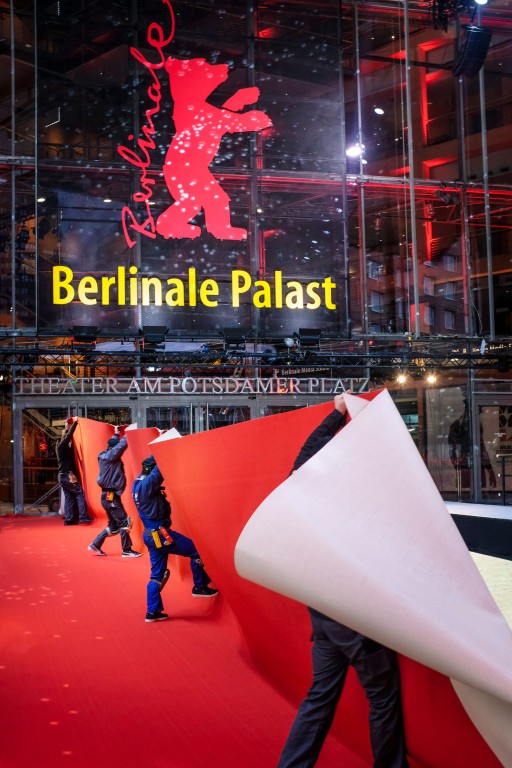
The Red Carpet is rolled out for the in-person festival
Since public ticket sales also took place exclusively online and the Potsdamer Platz Arkaden were still being renovated, there was no central meeting point for all the festival fans – also due to the Covid-19 protection policy. Jonathan Romney felt transported back to the time before 1989: “All this made the unusually quiet Palast area feel like an art installation tribute to the bygone days of Checkpoint Charlie” (“The Guardian”, February 19, 2022). Describing the edition as “strange”, his assessment was similar to the one by his German colleague Moritz Holfelder: “It was a strange Berlinale. [...] That which otherwise makes the film festival so special, meeting friends and colleagues from all over the world for a chat shortly before or after the screenings, was missing [...] this time. And when you exited the cinema in the evening and stepped onto the deserted Potsdamer Platz, you sometimes felt like you were in a ghost town [...]. At times it seemed as if the heart of the Berlinale had been ripped out” (“br24.de”, February 17, 2022). This once again affirmed that the Berlinale is more than the sum of the works on display: encounters and exchanges, the hustle and bustle of the festival – all this is not just an accessory but the beating heart of the event.
Covid-19 remained ubiquitous during the festival. The requirement to wear face masks, daily tests and the checkerboard pattern in which audiences were seated in the cinemas pervaded the experience. The influence of the virus was felt most clearly at the presentation of the Honorary Golden Bear to Isabelle Huppert: the day before the ceremony, the actor tested positive and was unable to travel. This did not detract from the celebrations, however. The award winner was connected via video link to the Berlinale Palast and was able to follow the very personal speech honouring her, given by her colleague Lars Eidinger, live. In this format, her charisma had an absolutely magical effect on the enthusiastic audience.
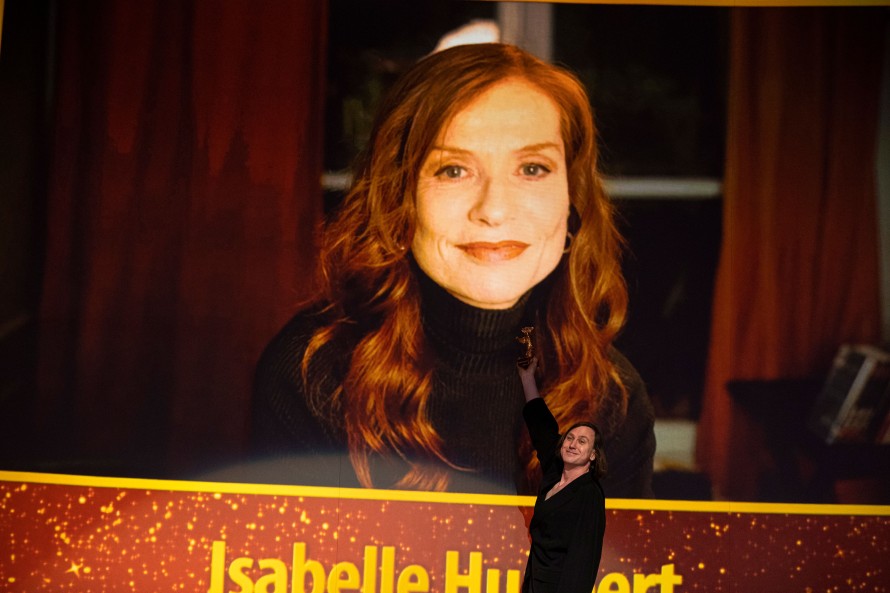
Isabelle Huppert looks on from Paris at her Honorary Golden Bear and laudator Lars Eidinger
Films With and Without Covid-19
The virus actually registered its weakest presence on the screen. Only two of the 18 films in the Competition featured face masks – the accessory that, by the previous year at the latest, had become a natural part of everyday life for almost all inhabitants of planet Earth. This absence was a very conscious decision by the selection committee: “Basically, it must be noted that the pandemic and the lockdown have left a strong impression on filmmakers. Many of the submitted films were shot during the lockdown. That means: one location and a small number of characters. However, we only selected a few of those. We had the impression that they were too similar and, above all, dealt with very similar topics” (Carlo Chatrian in an interview with Thomas Schultze, “Blickpunkt:Film”, January 28, 2022). The virus scarcely played a role in the films of the Panorama programme either. Nonetheless, as in the Competition, these films often took a closer look at specific milieus, depicting family relationships and those between couples. “The private sphere, the family, children, marriage and love, illness and death, have obviously taken on a different significance as a topic after several global lockdowns,” as Gunnar Decker wrote (“nd”, February 18, 2022).
The Forum was an outlier in this regard. Section head Cristina Nord explained the number of films dealing directly with the pandemic thus: “We usually show films that cost comparatively little money to produce, that make do without stars and that are dedicated to a radical, personal perspective. This means that the filmmakers we are interested in can usually react more flexibly and quickly to current developments [...]” (in an interview with Kira Taszman, “filmdienst.de”, February 16, 2022).
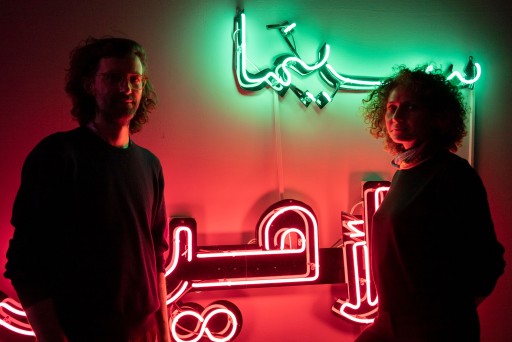
Ulrich Ziemons and Ala Younis, the two co-heads of Forum Expanded
The new section heads of Forum Expanded, Ala Younis and Ulrich Ziemons, also discussed in detail in an interview the influence of the virus on both the works themselves and the work of the curators (Younis and Ziemons had already taken over from Stefanie Schulte Strathaus, one of the founders of the section, in August 2021). At Berlinale Series, the pandemic had an indirect impact on the works, as section head Julia Fidel explained: “I think there is a little less experimentation but a lot of really strong, classic storytelling. Creators are building themselves a certain framework, say within detective or hospital shows, and then pushing those boundaries” (in an interview with Aaron Rottenberg, “list23”, January 31, 2022).
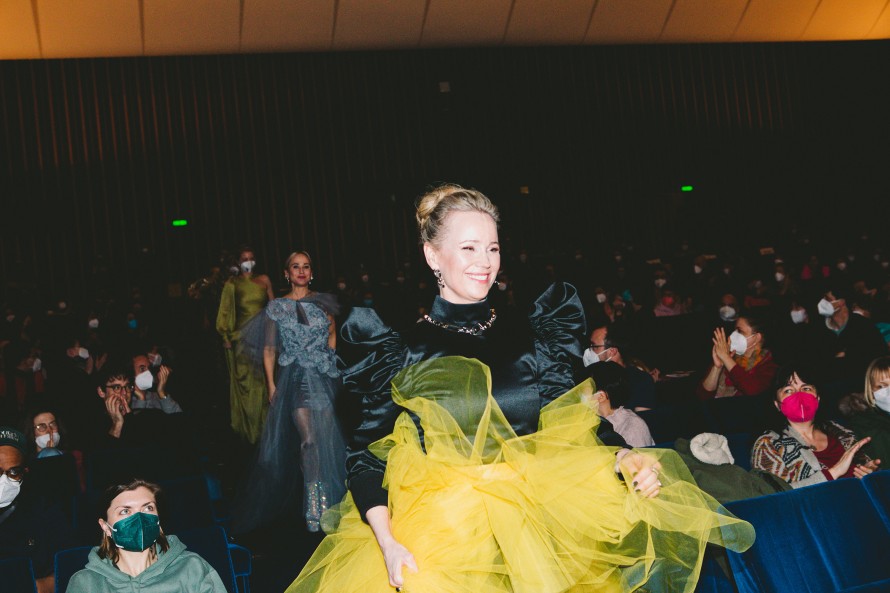
The colorfully clothed cast of the series Lust by Frans Milisic Wiklund and Ella Lemhagen
The Competition brought together a high number of familiar faces. “Twelve of the 18 directors have been invited to the festival previously, eight have featured in the Competition and five have even won a Bear already” (Katja Nicodemus in an interview with Claudia Christophersen, “NDR Kultur”, January 19, 2022). The focus was clearly on auteur cinema with the line-up impressively rich with names such as Claire Denis, Ulrich Seidl, Hong Sangsoo, François Ozon, Paolo Taviani and Ursula Meier. Many critics appreciated this selection with Andreas Busche affirming in the “Tagesspiegel” that “in his third year as artistic director, Carlo Chatrian has further sharpened the profile of the festival, with a stronger focus on documentaries, advanced narrative forms and auteur cinema” (January 19, 2022). Others, however, sorely missed a star line-up with high-profile names in the programme which could have inspired increased excitement around the Red Carpet. As David Steinitz rather caustically put it: “Nothing against cinematic art and experiments, against long-serving yet nevertheless still unknown auteur filmmakers [...]. But as an A-list festival, you also need a little glamour” (“Süddeutsche Zeitung”, February 10, 2022).
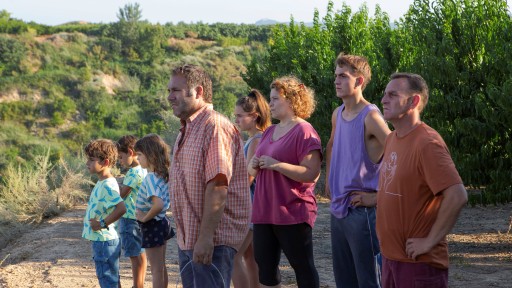
Still from Alcarràs by Carla Simón
An Evening of Women
Even if there was some ambivalence, everyone agreed on one thing about the decisions of the International Jury: the night belonged to the women. A fact that was particularly highlighted when, with Alcarràs, Carla Simón, working with her producer María Zamora, became the third female director in a row to win the main prize at one of the major European festivals (after Julia Ducournau with Titane at Cannes and Audrey Diwan with L’événement at Venice). At a time when the proportion of women in all areas was being viewed with scepticism, the 72nd Berlinale was fully convincing: with Natalia López Gallardo (Jury Prize), Claire Denis (Best Director), Meltem Kaptan (Best Leading Performance), Laura Basuki (Best Supporting Performance) and Laila Stieler (Best Screenplay), women won awards in six of the eight categories. The Silver Bear for Outstanding Artistic Contribution went to Rithy Panh and his collaborator Sarit Mang while Hong Sangsoo was awarded the Grand Jury Prize. And all this from an International Jury under the presidency of M. Night Shyamalan in which the gender distribution was almost equal.
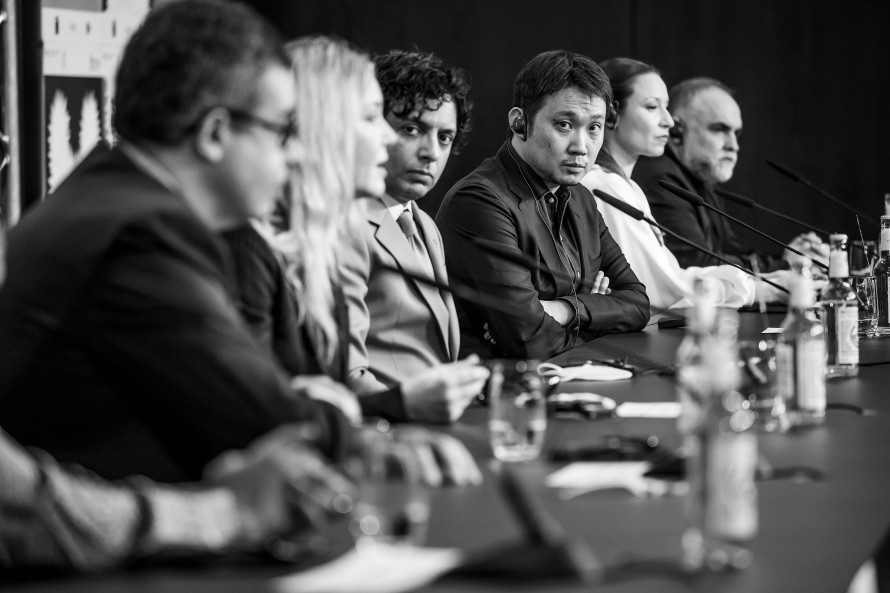
The International Jury at the Press Conference
In 2019, International Jury member Rajendra Roy wore a T-shirt with the slogan “THE FUTURE OF FILM IS FEMALE”, a proclamation that – at least on this particular evening in 2022 – was fulfilled. And beaming down on everyone was the German-Turkish comedienne Meltem Kaptan who followed her strong performance in Andreas Dresen’s Rabiye Kurnaz gegen George W. Bush with another, this time on the stage of the Berlinale Palast: “That actors have – or at least should have – a screen presence is integral to the craft. If they don’t have it, they have to learn it. But that is far from describing the effect of Meltem Kaptan, the impact she has when she steps onto a stage like that of the Berlinale Palast for the 72nd International Film Festival’s award ceremony, this energy that she derives directly from the earth and that she then just as directly passes on to others as if she were a medium” (Sonja Zekri, “Süddeutsche Zeitung”, February 17, 2022).
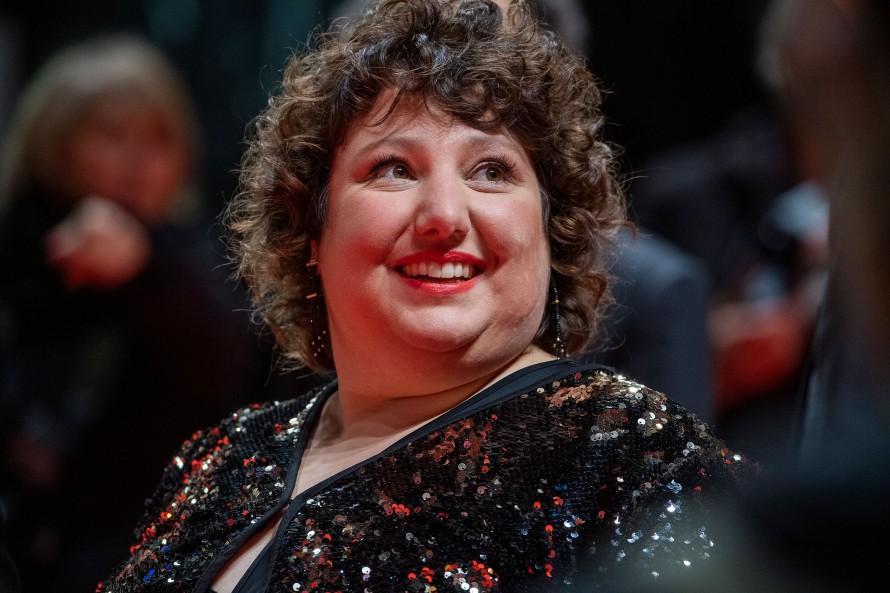
The actor Meltem Kaptan (Rabiye Kurnaz vs. George W. Bush by Andreas Dresen)
Meanwhile, for many, the names of two men were missing on the list of the Bear winners: Michael Koch, who only received a Special Mention for Drii Winter (A Piece of Sky), and Ulrich Seidl.
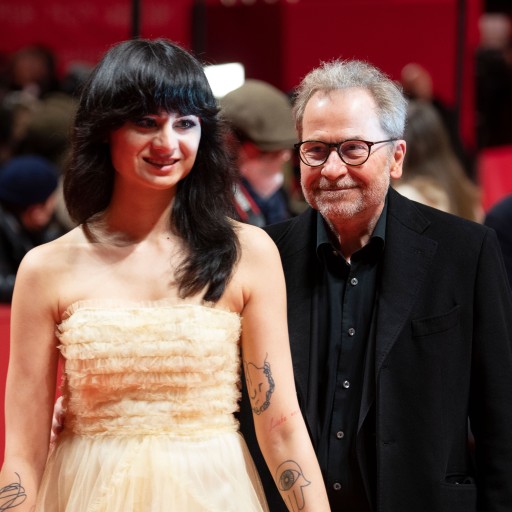
Kurdwin Ayub and Ulrich Seidl: the director and the producer of Sonne
As Jessica Kiang wrote: “But for all its sunshine and sad, brave wisdom, ‘Alcarràs’ was, for me, outmatched by a much wintrier competition title. Ulrich Seidl’s ‘Rimini’ is an uncompromising, coldly provocative drama that gathered no prizes, which is a shame. But that its star, Michael Thomas, playing a washed-up club singer in an off-season Italian beach town, was not specifically recognized is more or less a crime” (“The New York Times”, February 17, 2022). Ulrich Seidl could at least console himself with the fact that Kurdwin Ayub’s Sonne, which he produced, won the GWFF Best First Feature Award.
A Future with Uncertainties
The 72nd Berlinale ended with relief, cautious joy and a lot of hope and fear when looking towards the future. With 156,000 tickets sold, it could certainly be considered a success in view of the reduced seating capacity and, for many, the joy about finally being able to watch films in the cinema again and take in the festival atmosphere was the predominant emotion. Jessica Kiang, for example, summed it up like this: “The category error from complainants is to compare this reduced-attendance edition with Before Times Berlinales. The real comparison is with last year’s online version, which debuted a stronger selection of films but didn’t feel like a festival at all. Consider that lonely experience as the alternative and the staircases, seating hassles and swabbing become a small price to pay” (“The New York Times”, February 17, 2022). Anke Sterneborg added in her text on “rbb24.de”: “What else remains of this festival? The courage or daring of Carlo Chatrian and Mariette Rissenbeek to wrest an in-person festival from the virus. It did not turn out to be a super-spreading event, as some had feared, but a strong signal for cinema and culture, as others had hoped. A Berlinale in an exceptional state, the great fortune to be able to see films in the cinemas with guests on the stage and audiences in the seats – this is what many filmmakers were extremely enthusiastic about these past few days” (February 21, 2022).
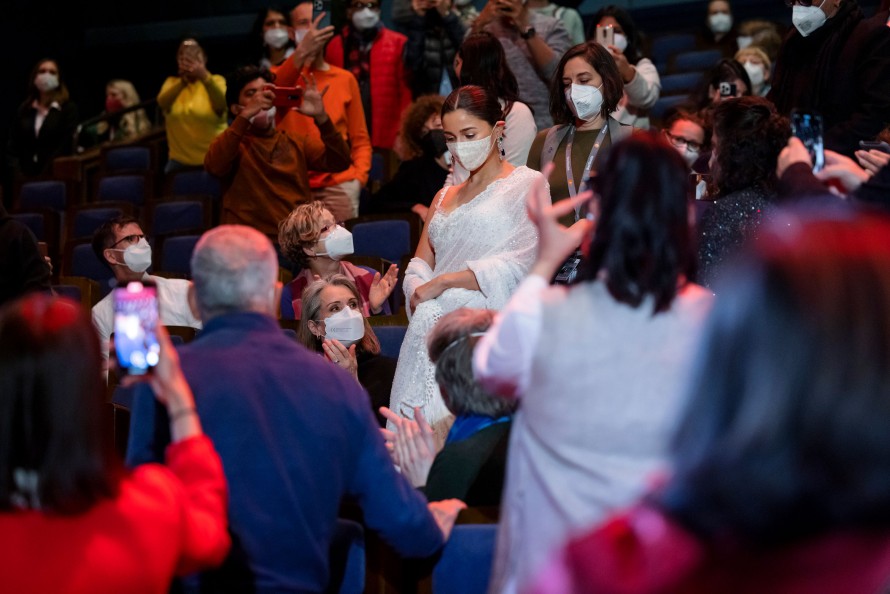
Alia Bhatt, protagonist of the Indian film Gangubai Kathiawadi
Other commentators saw the situation from a different perspective: “The Berlinale has asserted itself. It has risen from the abyss of the last year, albeit with some injuries and a loss of allure and significance. But its structural problems remain. World cinema, especially that from America and the Far East, is no longer a natural guest in Berlin. [...] The managing director Mariette Rissenbeek and programme director Carlo Chatrian have been in office for three years now. They will soon have to reorganise the film festival to maintain its position among the festivals. With or without a pandemic” (Andreas Kilb, “Frankfurter Allgemeine Zeitung”, February 16, 2022).
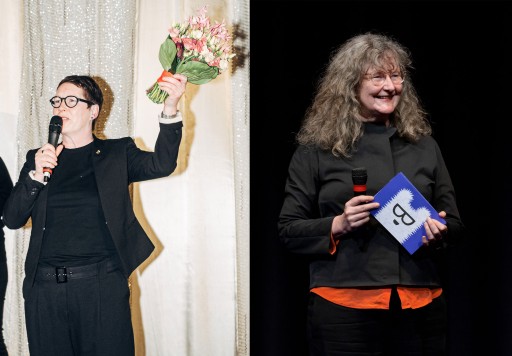
Linda Söffker (Perspektive Deutsches Kino) and Maryanne Redpath (Generation)
The decoupling of the festival from the European Film Market was also striking. While one side suffered greatly from the restrictions, for the other, it was an opportunity to venture into new dimensions: “The downbeat feel at the Berlin festival this year contrasted with the optimism and bustling business of Berlin’s European Film Market [...]” (Scott Roxborough, “The Hollywood Reporter”, February 16, 2022).
There were some special farewells at the end of the festival: for both Linda Söffker in Perspektive Deutsches Kino and Maryanne Redpath in Generation, the 72nd Berlinale was their last edition as section heads.
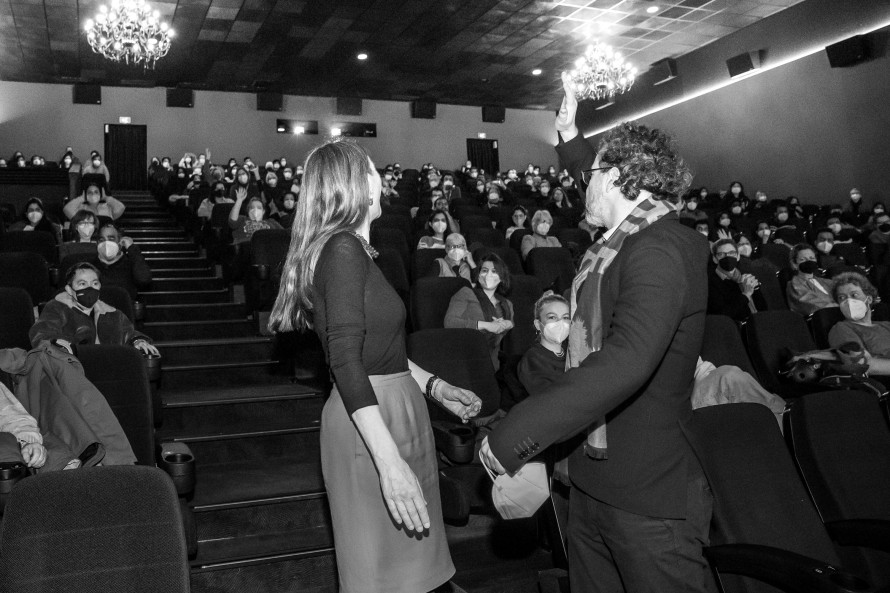
See you next year!
And looking at the situation in the world, the times soon became more uncertain than they had been for a long time: only four days after the end of the festival, on February 24, 2022, Vladimir Putin gave the order for his troops to invade Ukraine. It was a decision that completely reshuffled the global balance of power and alliances and which would redraw the political map for years to come, with probably even more devastating consequences than those brought about by the coronavirus which broke out irreversibly across the world shortly after the end of the 70th Berlinale.
Facts & Figures of the 2022 Berlinale
| Visitors (with reduced seating capacity of 50 % due to Corona) |
|
|---|---|
| Total amount of theater visits |
223,627 |
| Tickets sold | 156,472 |
| Professionals | |
| Accredited guests (press excl.) |
8,799 |
| Countries of origin | 130 |
| Press | |
| Journalists |
1,628 |
| Countries of origin | 82 |
| Screenings | |
| Number of films in the public programme |
229 |
| Total amount of screenings | 1,093 |
| European Film Market (Digital edition in 2022) | |
| Film industry participants | 5,600 |
| Number of films | 827 |
| Number of screenings | 1,300 |
| EFM virtual stands | 220 |
| Number of exhibitors | 598 |
| Berlinale Co-Production Market | |
Participants |
574 |
| Countries of origin | 64 |
| Berlinale Talents | |
| Participants |
197 |
| Countries of origin | 72 |
| Annual budget (preliminary) | €28.8 million |
| The Berlin International Film Festival receives €10.7 million in institutional funding from the Federal Government Commissioner for Culture and the Media. In addition, the NEUSTART KULTUR programme compensates for revenue lost and additional expenditure incurred due to the Covid-19 pandemic. | |
Gender Statistics 2022
Submissions in the Berlinale programme (based on Berlinale database):
- Total number of submissions: 6.755
- Direction: 33.4% female, 57.5% male, 3.1% non-binary, 1.8% prefer not to say, 4.2% balanced
- Production: 35.8 % female, 46.9% male, 2.7% non-binary, 1.4% prefer not to say, 13.2% balanced
Selection in the Berlinale programme (based on Berlinale database):
- Total number of films evaluated (Retrospective and other historical films, installations and Berlinale Series not considered): 209
- Direction: 39.2% female, 50.7% male, 2.9% non-binary, 3.4% prefer not to say, 3.8% balanced
- Production: 35.9% female, 40.2% male, 3.8% non-binary, 4.3% prefer not to say, 15.8% balanced
The complete dossier on the Berlinale gender evaluation (1.9 MB)